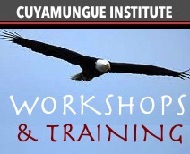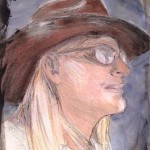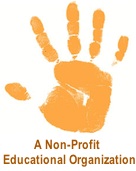 Letter from the President
Letter from the President
by Paul Robear
Last year I was deeply inspired while in attendance for a passionate call to protect the environment by Jewell James, a long-time leader of the Lummi Indian Nation. At an outdoor event he spoke for about an hour in a loud voice that echoed off the nearby hillside. I could feel his call to action stir deeply within me. I was reminded that that the original environmental movement was the indigenous people from around the world where traditional knowledge has it’s foundation. Today more than ever we need the voices of traditional knowledge to be heard.
Searching the web I found that “traditional knowledge” has become the accepted term to encompass the insights, discoveries and understandings of indigenous people. This knowledge has been acquired by indigenous people through observation, experience and long-term association with place. What can we learn from traditional ways of relating to the natural world and the human experience? Historically, western science has had a tendency to dismiss the traditional knowledge of indigenous peoples as anecdotal, non-quantitative, without method, and unscientific.
However, I think it is exciting that some progressive researchers are finding ways that allows native and scientific knowledge to interact in a complementary fashion. The time has come for western science to regard indigenous knowledge as a parallel systems of knowledge.
In large part it is the indigenous approach to the environment that has received the most attention from western science. And, in addition, my personal passion is following the cutting edge research happening in the area of mind/brain and altered states of consciousness (ASC) studies. To expand our understanding of the experience of (ASC), we need to look to research that draw on parallels from western science and traditional knowledge. The nature of consciousness has intrigued western philosophers and scientists for hundreds of years and many modern neuroscientist now include the research the traditional knowledge of indigenous peoples. Rooted in traditional methods, indigenous people have found ways to understand and interpret their experience and, they tell us, experiencing ASC is a normal part of their lives both historically and culturally.
Cuyamungue Institute’s founder Dr. Felicitas Goodman, a cultural anthropologist, was one of many pioneer ASC researchers that saw the need for we non-indigenous people to observe and engage in direct experience and ritual to incorporate traditional knowledge with western science. It stands to reason that if we should draw on this early form of systematic observation and explanation to contribute to the relatively recent process called the “scientific method”.
My hope it that we can continue to breakdown down some of the resistance in western science and engage the wisdom of traditional knowledge not only as a way to contribute to the study of altered states of consciousness but to address the many challenges that face us as a humanity.
In This Issue
![]() * Western Science and Traditional Knowledge
* Western Science and Traditional Knowledge
by Fulvio Mazzocchi, Institute for Atmospheric Pollution of CNR, Monterotondo, Italy.
* Recently at CI: Initiatory Training: Solstice Full Moon at Cuyamungue
* Workshop schedule update: including the preview for 2017 season.
—
—— Scroll down for links to articles.
Once again, thank you for your continued support of the Cuyamungue Institute!
Paul Robear
President / Executive Director
Cuyamungue: The Felicitas D. Goodman Institute
![]()
 Western Science and Traditional Knowledge:
Western Science and Traditional Knowledge:
Despite their variations, different forms of knowledge can learn from each other
by Fulvio Mazzocchi
Cultures from all over the world have developed different views of nature throughout human history. Many of them are rooted in traditional systems of beliefs, which indigenous people use to understand and interpret their biophysical environment. These systems of managing the environment constitute an integral part of the cultural identity and social integrity of many indigenous populations. At the same time, their knowledge embodies a wealth of wisdom and experience of nature gained over millennia from direct observations, and transmitted—most often orally—over generations. ———–> Full Article
![]()
 Initiatory Training: Solstice Full Moon at Cuyamungue
Initiatory Training: Solstice Full Moon at Cuyamungue
At our recent Initiatory Training something rare and special happened at CI. There is always an exciting energy that ignites each gathering on the 472 acres that is home to our Institute, but this time we had an additional boost from both sun and moon. I’m talking about a celestial event that won’t happen again until 2062, the Solstice Full Moon. So we knew we were in for something special!
As is the tradition at CI, we created own own celebration and rituals for the moment. For this moment, we had Grandmother Moon, who we honor each month as she waxes into fullness for the cycles that regulate earth’s waters and moods, and for shining a mirror back to us for reflection. We honor the twice yearly Solstices, the far reaches of the pendulum swing of the sun’s daily rise over the mountains. And we had Father’s Day on which to honor our ancestors.
Thank you to all who attended!
![]()
 2016 Workshops, Events and Training at Cuyamungue:
2016 Workshops, Events and Training at Cuyamungue:
Each workshop contains a specifically designed series of ritual postures to provide the context for a journey of self-discovery. We go deep within utilizing the Cuyamungue Method – which includes a established ritual journey method. Introductory workshops are are prerequisites for advanced classes.
2017 Workshop Season! Here is the announce workshops and events for 2017 at the Cuyamungue Institute, so you can get the jump-start on making your plans to join us this season. future. There may be adjustments to dates, times and details, and additional events and workshops will be added. Contact us prior to booking flights and making travel arrangement. Feel free to ask questions.
![]()
July 27th – 31st – Initiatory Training
August 3 – 7 – Initiatory Training – Advanced Course
August 16 – 21 – Instructor Training – Contact us
August 23 – 28 –Men’s Conclave Contact us
September 20th – 25th – Masked Trance Dance – Contact us
June 1st – 7th , 2017 – Volunteer Week – If interested, ask us for details
June 9th – 11th , 2017 – Board of Directors Meeting
June 21st – 25th , 2017 – Initiatory Training
July 8th 2017 – Cuyamungue Explorers Club
July 19th – 23rd , 2017 – Initiatory Training
August 9th – 13th, 2017 – Initiatory Training – Advanced Course
August 22nd – 27th, 2017 – Instructor Training
September 5th – 10th , 2017 – Masked Trance Dance
September 19th – 24th , 2017 Men’s Conclave
September 26st – October 1st , 2017 – Volunteer Week – If interested, ask us for details
![]()
The Cuyamungue Institute, like many non-profit organizations, has limited resources. We are proud of the scope of work we have already accomplished. However, there is much more to do, and we depend upon your support. We always use our all resources with great care. Our focus and key priority to continue to ensure the financial stability of CI for the future.
There are several ways to participate:
- Attend workshops at the Institute – Bless yourself and the Institute! Workshop fees directly support the land and buildings.
- Be a Volunteer – Ask about existing, on-going projects you can help with. Or suggest projects that you can work on, fund, or both!
- Personal Donations – 100% of your donations and gifts go directly to the Institute, and are tax deductible.
- Corporate Donations – Your company can have a tremendous impact. Also ask us how we can bring our work to your company!
- Planned Giving – Including the Cuyamungue Institute in your estate plans can help you accomplish a charitable goal while realizing potential significant tax savings and supporting the future of the Cuyamungue Institute. More Information
Please consider making a donation by clicking here. Ongoing research and new applications of this work with Ritual Postures is only possible because of donations made by people like you. Laura Lee, our Director of Outreach and Development, is available to answer your questions and to provide more information. Contact her at lauralee@cuyamungueinstitute.com ![]()
![]() How to Submit an Article: As part of expanding our Cuyamungue Institute community, you are invited and encouraged to participate. Share how you use the Cuyamungue Method in your chosen field. We are also open to other topics, with the emphasis on the posture work, and research and or experience. More information
How to Submit an Article: As part of expanding our Cuyamungue Institute community, you are invited and encouraged to participate. Share how you use the Cuyamungue Method in your chosen field. We are also open to other topics, with the emphasis on the posture work, and research and or experience. More information
![]()
![]() Thanks for reading! Please forward this to your friends and acquaintances who will enjoy learning more about us, and please let me hear from you! I am most happy answer any and all questions about the Institute or the Cuyamungue Method. We welcome all correspondence. Not already subscribed? Subscribe Here.
Thanks for reading! Please forward this to your friends and acquaintances who will enjoy learning more about us, and please let me hear from you! I am most happy answer any and all questions about the Institute or the Cuyamungue Method. We welcome all correspondence. Not already subscribed? Subscribe Here.
Email me directly at paulrobear@cuyamungueinstitute.com . 
Blessings,
Paul Robear
President / Executive Director
Cuyamungue – The Felicitas D. Goodman Institute


